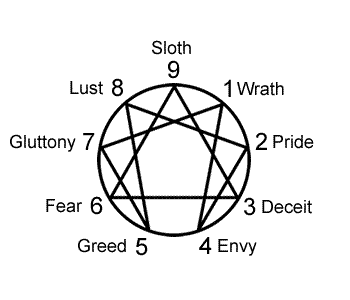Enneagram Sins: The 7 deadly sins of Christianity + 2

The Enneagram sins relate the seven deadly sins of Christianity to the passions of the Enneagram personality types. Because there are only 7 deadly sins but 9 personality types, the Enneagram sins are also referred to as the 7 deadly sins + 2.
The personality types find their way into the Christian world
During the 1970s, the Enneagram types found their way into various Christian communities. A number of pioneering teachers and authors had their introduction to the types via these communities (e.g., Don Riso, Richard Rohr, Jerome Wagner, Suzanne Zuercher, Kathleen Hurley and Theodore Donson).
The first book published on the Enneagram personality types came from this lineage as well in 1984, The Enneagram: A Journey of Self-Discovery by Maria Beesing, Robert J. Nogosek, and Patrick H. O'Leary
The 7 deadly sins + 2
The Enneagram passions are sometimes correlated to the 7 deadly sins of Christianity (also called the 7 capital or cardinal sins).
- Type 1: Anger or Wrath
- Type 2: Pride
- Type 4: Envy
- Type 5: Avarice or Greed
- Type 7: Gluttony
- Type 8: Excess or Lust
- Type 9: Laziness or Sloth
The +2 is added to account for all nine Enneagram types.
The Enneagram Passions and Virtues
The passion is an indication of how "stuck" or "fixated" we are in our Enneagram type. As we begin to work on ourselves to find freedom from the limitations of our Enneagram type, the passion begins to subside and the virtue begins to appear.
- Passion: Anger is an energy that corrects and improves what's unacceptable. "It's primarily directed at myself and secondarily at others and the world at large."
- Virtue: Serenity appears when you become more accepting of things as they are instead of demanding that they meet your standards for how things should be.
- Passion: Pride is an inflated feeling of self-importance in the lives of others. "Others need me because I uniquely understand and can meet their needs and desires."
- Virtue: Humility appears when instead of seeking favored treatment and regard you accept that you are no more or less important than anyone else.
- Passion: Deceit involves taking on a persona that appeals to an intended audience. "I have difficulty knowing who I am separate from the image I'm presenting."
- Virtue: Truthfulness appears when you find a sense of self that is true to who you are instead of playing to the expectations of an intended audience.
- Passion: Envy is a one-sided comparison between the positives of others and the negatives of oneself. "What's lacking in me that I don't have what they have?"
- Virtue: Equanimity appears when you also see the positives you have to offer instead of just the negatives when comparing yourself to others.
- Passion: Avarice is a hoarding of resources and minimizing of needs in order to avoid intrusions. "I can avoid entanglements by managing my resources."
- Virtue: Detachment (Non-Attachment) appears when you allow yourself to more freely participate in the world instead of observing it from the sidelines.
- Passion: Fear arises from a sense of uncertainty and doubt within. "I scan others and the world around me to locate dangers and find something to reassure me."
- Virtue: Courage appears when you step into action as circumstances dictate in spite of any lingering doubts or fears that you may have about doing so.
- Passion: Gluttony of the mind is the pull felt toward interesting possibilities. "Why get mired in boredom or discomfort when pleasurable alternatives are available?"
- Virtue: Sobriety appears when you see endeavors through to the end instead of moving on to something easier and more interesting than what's at hand.
- Passion: Excess of expansive energy that needs to be released through activity and expression. "This energy feels natural for me but I may have to sit on it when others find it too much."
- Virtue: Innocence appears when you allow yourself to experience tenderness and vulnerability instead of habitually pushing out against the world.
- Passion: Laziness is a difficulty with defining and accomplishing goals. "I tend to go along with what others are doing and lose myself in routine and comfort."
- Virtue: Action appears when you pursue what's meaningful to you instead of simply going along to get along or falling into habitual routines and comfort.
Click here for the Complete Guide to the Enneagram.
This free guide explains- the nine Enneagram personality types
- the many type variations within type
- where the types came from (origins and history)
- how the types use the Enneagram symbol
Click here for Enneagram tests.
These free tests help you find your- primary type
- candidate types
- preferred wing
- intinctual subtype
- instinctual variant stacking
- center types (gut, heart, and head)
- tri-center with wings